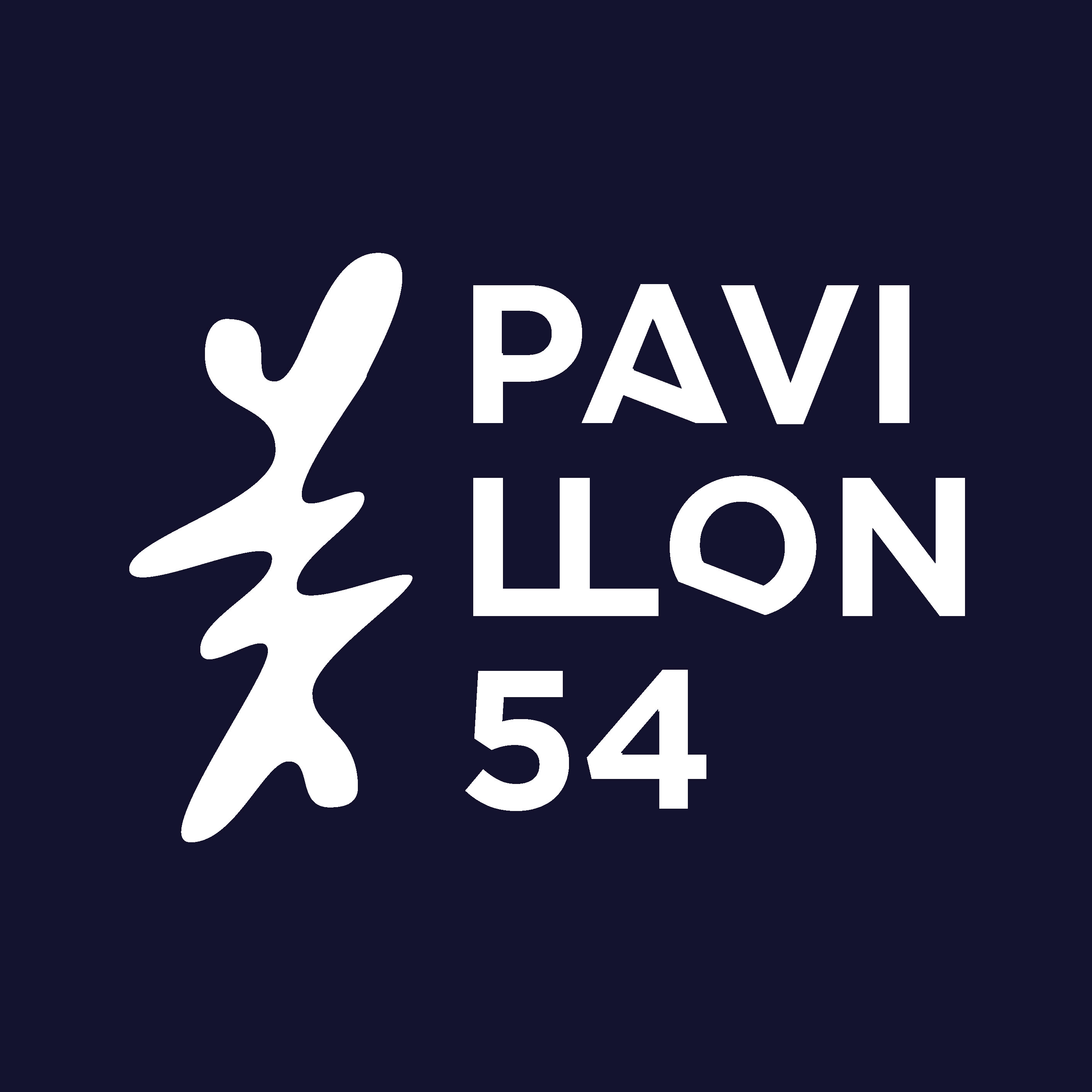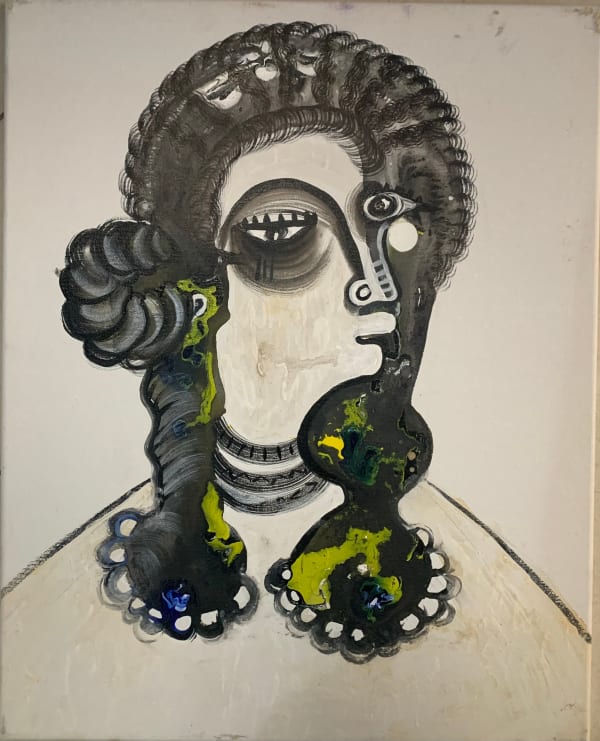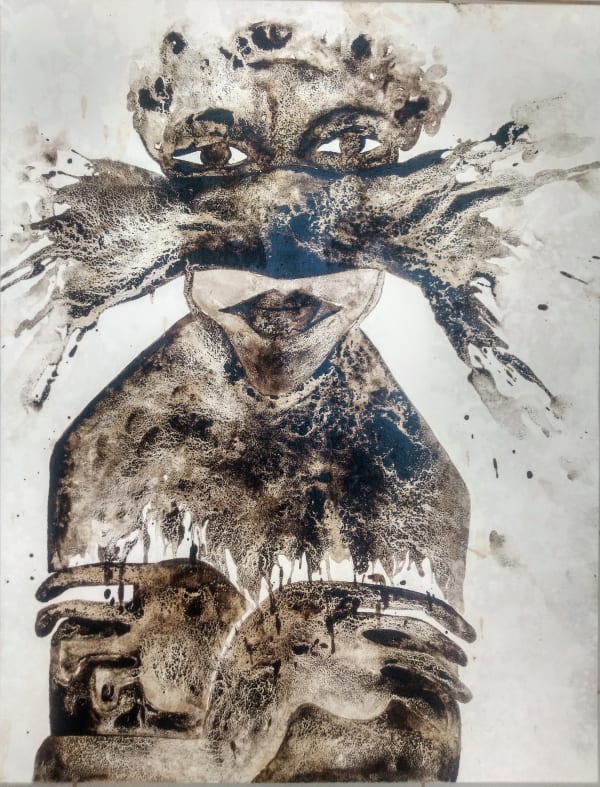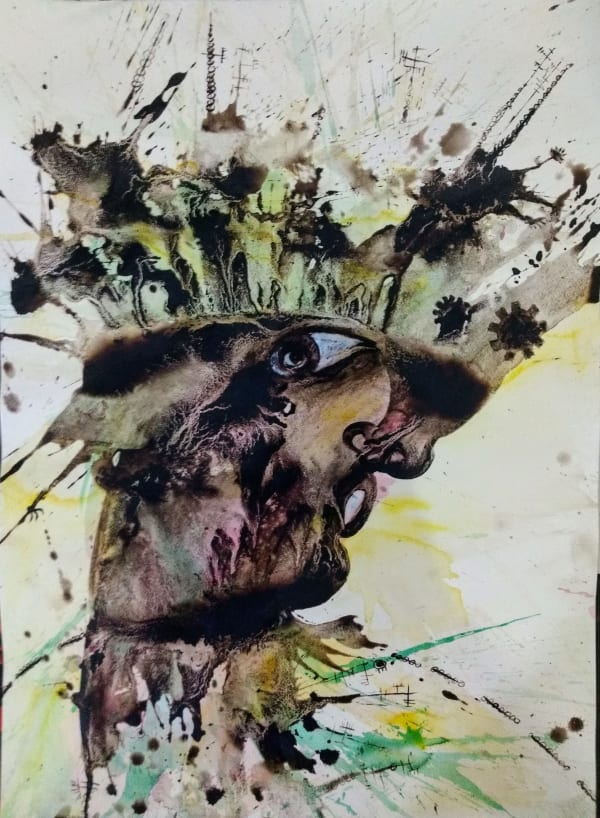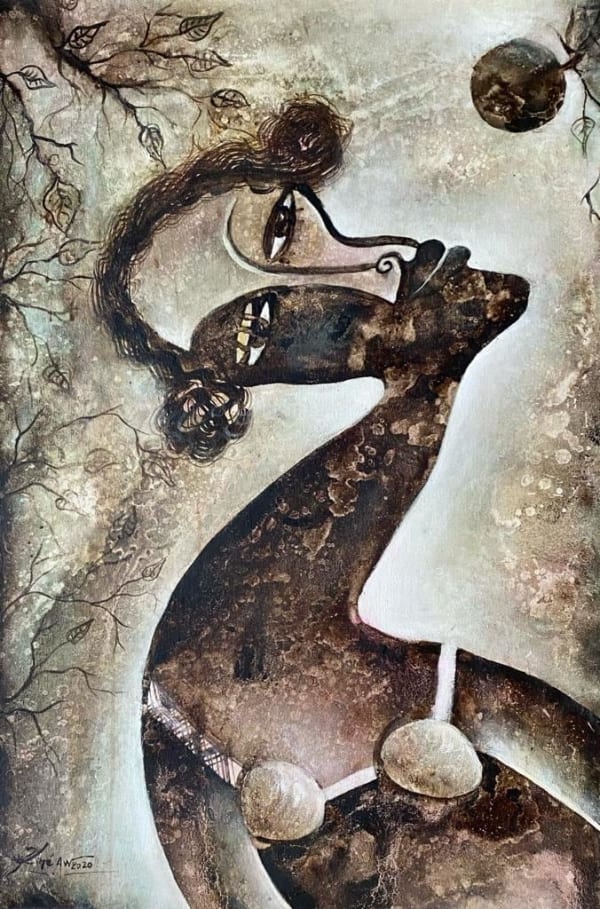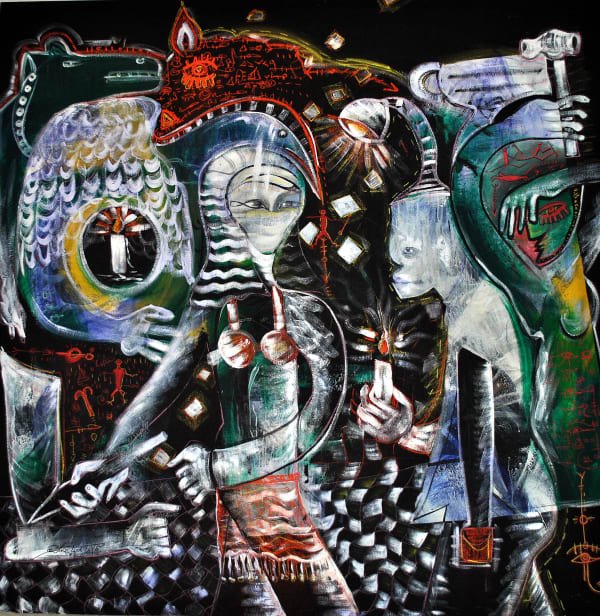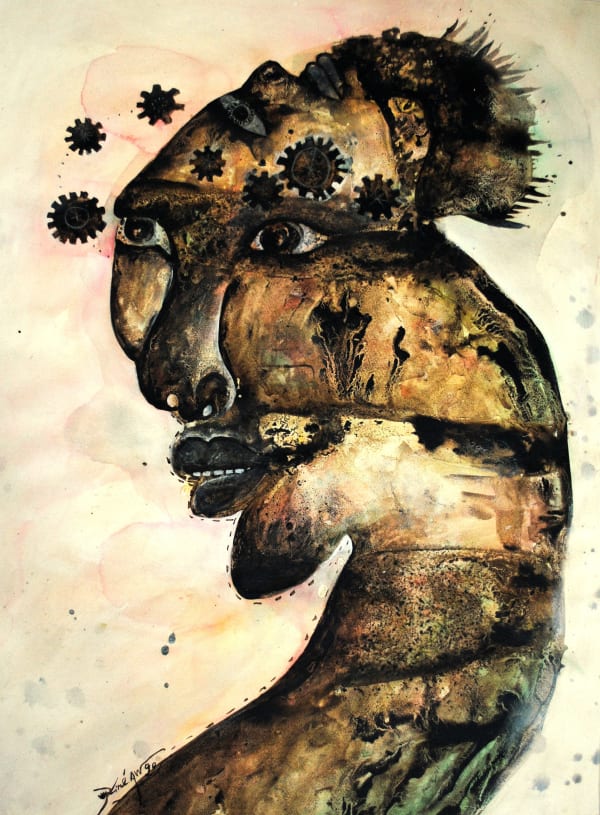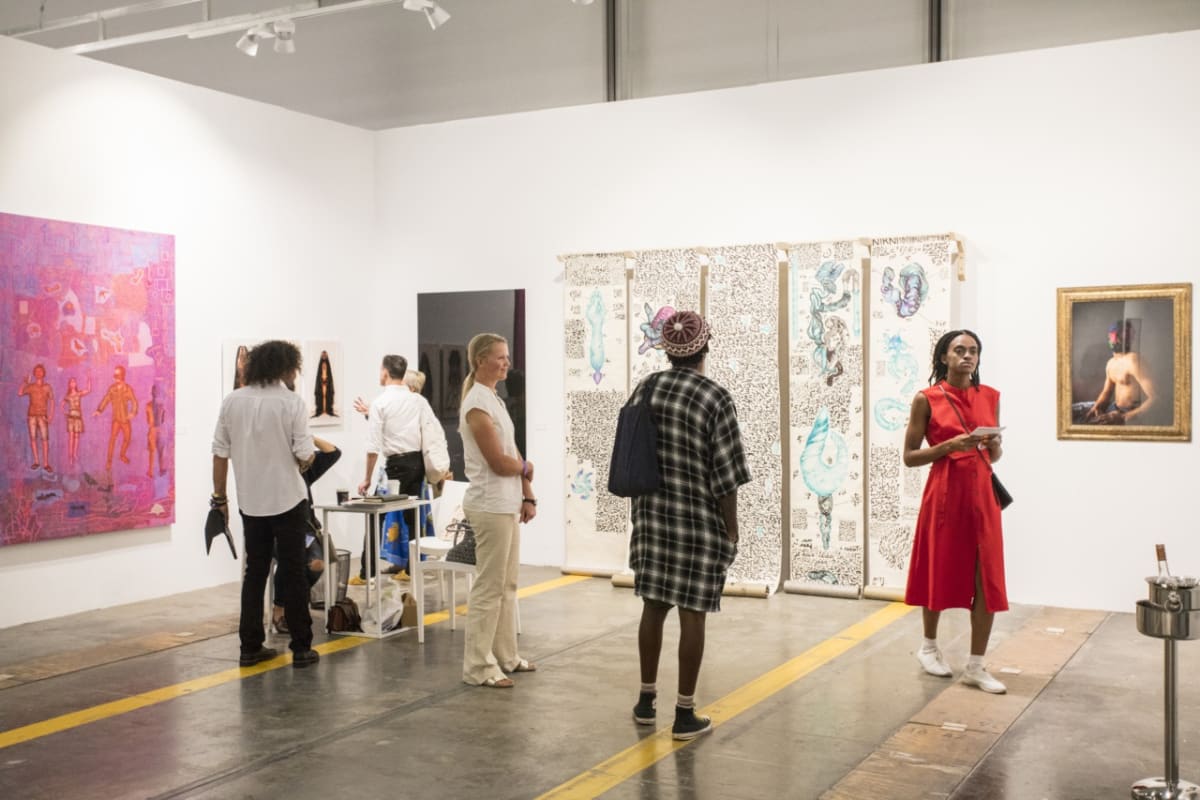"The artistic approach of Fatou Marie Françoise Aw, known as Kiné Aw, which has been presented several times in Dakar and abroad, brings together - by reflecting deeply on it - the base of 'traditional values' on which she builds her work, and the so-called modern world, a reflection of plural interactions. Her painting is the place where original expressions and practices intersect, in a permanent concern to reflect social life.
At the heart of the human being that she tries to explore, there is a vision: to make visible an interior without betraying its secret artifices, in order to bring out a personal conception of the relationship of women with their society. These are therefore readings and questions on the identity of this woman confronted with multiple challenges that put her in dialogue - sometimes conflicting - with her ancestral beliefs and values. There is what society assigns to her as roles and missions, but there is what she wants to put forward: her struggles for more freedom, her daily fights for her rights, her desires and desires...
Tar on canvas, acrylic paint, pigments are the means of expression that have allowed her to present her proposals so far. From the disorder she sees and wants to change, she creates an 'order' that sets her apart, built on the idea that Africa, her creative terrain, is tending towards a 'modernity' that is countered by secular life forces."
Aboubacar Demba Cissokho, Journalist
-
 Kiné AwHybridité, 2023acrylic technique, pigment on canvas19 3/4 x 23 5/8 in
Kiné AwHybridité, 2023acrylic technique, pigment on canvas19 3/4 x 23 5/8 in
50 x 60 cmKiné Aw, Hybridité, 2023$ 1,300.00 -
 Kiné AwMursi, 2023acrylic technique, pigment on canvas23 5/8 x 19 3/4 in
Kiné AwMursi, 2023acrylic technique, pigment on canvas23 5/8 x 19 3/4 in
60 x 50 cmKiné Aw, Mursi, 2023$ 1,500.00 -
 Kiné AwTrouble, 2023acrylic technique, pigment on canvas51 1/8 x 35 3/8 in
Kiné AwTrouble, 2023acrylic technique, pigment on canvas51 1/8 x 35 3/8 in
130 x 90 cmKiné Aw, Trouble, 2023$ 3,400.00 -
 Kiné AwJeune Fille Bedik , 2022Acrylic, ink on canvas15 3/4 x 19 3/4 in
Kiné AwJeune Fille Bedik , 2022Acrylic, ink on canvas15 3/4 x 19 3/4 in
40 x 50 cmKiné Aw, Jeune Fille Bedik , 2022$ 1,760.00 -
 Kiné AwNow, 2020acrylic technique, pigment on canvas19 3/4 x 25 5/8 in
Kiné AwNow, 2020acrylic technique, pigment on canvas19 3/4 x 25 5/8 in
50 x 65 cmKiné Aw, Now, 2020$ 1,300.00 -
 Kiné AwTisserand, 2020acrylic, ink, charcoal, collage on canvas35 3/8 x 51 1/8 in
Kiné AwTisserand, 2020acrylic, ink, charcoal, collage on canvas35 3/8 x 51 1/8 in
90 x 130 cmKiné Aw, Tisserand, 2020$ 3,400.00 -
 Kiné AwAliénation , 2019acrylic, charcoal, pigment on Canson29 7/8 x 21 7/8 in
Kiné AwAliénation , 2019acrylic, charcoal, pigment on Canson29 7/8 x 21 7/8 in
76 x 55.5 cmKiné Aw, Aliénation , 2019$ 2,010.00 -
 Kiné AwEve, 2019acrylic technique, pigment on canvas27 1/2 x 15 3/4 in
Kiné AwEve, 2019acrylic technique, pigment on canvas27 1/2 x 15 3/4 in
70 x 40 cmKiné Aw, Eve, 2019$ 1,950.00 -
 Kiné AwEvolution, 2019acrylic, Pastel on canvas78 3/4 x 78 3/4 in
Kiné AwEvolution, 2019acrylic, Pastel on canvas78 3/4 x 78 3/4 in
200 x 200 cmKiné Aw, Evolution, 2019$ 7,035.00 -
 Kiné AwL’ombre de Moi , 2019acrylic, charcoal, pigment on Canson28 3/8 x 20 1/8 in
Kiné AwL’ombre de Moi , 2019acrylic, charcoal, pigment on Canson28 3/8 x 20 1/8 in
72 x 51 cmKiné Aw, L’ombre de Moi , 2019$ 2,010.00 -
 Kiné AwMachination, 2019acrylic, pigment on Canson29 7/8 x 21 7/8 in
Kiné AwMachination, 2019acrylic, pigment on Canson29 7/8 x 21 7/8 in
76 x 55.5 cmKiné Aw, Machination, 2019$ 2,010.00
Kiné Aw was born in 1977 and describes her childhood in Kinshasa, Democratic Republic of Congo, as the catalyst for her passion for art. Since graduating from the National School of Arts in Dakar in 2006, Kiné Aw has been working in one of the fifty workshops in the Village des Arts, in what she calls her "laboratory". There she has developed a body of work that tends towards surrealism and cubism, as well as numerous works inspired by women and their struggles. It is this attraction to the representation of the female form that led the art critic Babacar Mbaye Diop to call her work "curvature". She exhibits regularly in Senegal, the United States and Europe.
